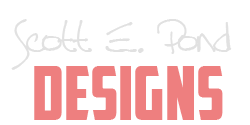Imagine it.
You are starting a new project, one using skills you have never quite done before.
You're excited. This is something new. It doesn't seem so hard because it's SIMILAR to stuff you've done before, but not exactly the same. You think that it is completely in your wheelhouse. It's something you've wanted to do, wanted to try, for a while now, but just never found the time or opportunity to do so.
Until now.
You've got all your supplies needed, plus some you think you MIGHT need if you change it up a little or hit any snags. You are in your favorite creative space, in your favorite creative clothes, with your favorite creative snack and drink by your side. You've done everything in your power to set yourself up for success, for the best foot forward in this new project.
You. Are. Ready. To. Go!
Woo-Hoo!
You begin and at first things seem to be going just right.
And then it all falls apart and your screw it up big time.
Oh, crap.
We've all been here. At first we're very excited about this new project and then it feels like we're worthless, that we can't do anything right because we SCREWED UP THE PROJECT.
We hit our Creative Hurdle.
And it seems like it's way above our ability to jump over.
At this moment, we feel defeated; with the clay shattered at our feet, a drawn shape that is just not right, a sewn edge that skews too far off the desired seam, an accidentally deleted photo editing layer... no matter what it is, there is no easy way to fix it.
How do you respond?
As creatives, this can be a huge thing or a relatively minor thing. For those crusty creatives out there, we often have the experience to chalk it up to the learning curve, dust off our knees, and get back at it.
But that might only be a few of us.
On the other side of the response spectrum, is the fear, the disappointment, and feeling of lacking somehow.
Failure to do something right, to master a similar skill right out of the gate, has a potentially huge impact on many of us creative types. It starts with that feeling in the stomach that we MAY have done something wrong on this new project. A sinking feeling, followed by that initial churn of nausea. This is followed by a large gamut of feelings as we realize that yes, we truly messed it up. Anger. Shock. Disappointment. Sadness.
All of these feeling run through us at this moment as we see that the project has been ruined by what we have done, or haven't done, and that there is no way to truly fix the problem other than by starting over.
 For some of us, we hit the crippling hurdle point.
For some of us, we hit the crippling hurdle point.
That moment when our self doubt and disappointment override everything and actually make us want to quit doing this project, to shut down and just stop everything associated with it. This is the critical point where if we give in and listen to this doubts and that sad tiny little voice, we may actually give up.
Logic has no grasp on us at this moment. All we see is our failure doing something right the first time and we hear this tiny voice whispering that we are worthless, stupid, and unskilled and that we shouldn't have even been to arrogant as to think we could do something like this project.
Some give in to that voice, unfortunately.
But that is the wrong move. Think about it. You are doing something for the first time. It doesn't matter that you've done something similar to it before. This is a brand new application of skills. You shouldn't expect that you should be able to do this new project perfectly, without any error. You should expect mistakes and outright failure. Why? Because you are learning a new set of skills and applying them in a new manner. Every step, whether you know it or not, is forging new pathways through your neurons. Forging new trails through your grey matter.
Frankly you have to start somewhere. What better place to start than by making mistakes you can actually learn from!? That's the best way to build new skills: on the ashes of mistakes.
The worst thing you can do is quit.
Don't quit. Instead pick yourself back up, brush off your knees, and start over again.
Embrace the learning curve and step over that hurdle.
What kind of failures have your encountered and what have you done to forge ahead anew?
